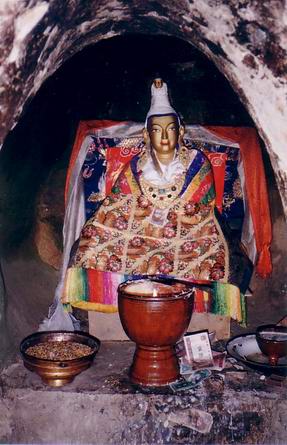Your search results [7 articles]
The verdict of a wise Tibetan King.
Le roi déclare en préambule : " I think you have to know that both of you, beverages, who are of great importance in Greater Tibet – in the country where the devotees of the most Holy Holder of White Lotus inhabit[1], as well as in other countries of the world, are the livelihood of those with precious human lives. You are of great importance for the power of Bodhisatva(s), as well as for the merits of all sentient beings. "
Therefore, Beer and Tea will remain linked for the time to come in Tibet. Neither drink will be banned, forbidden or excluded from either the Court or the monasteries.
Then comes the special provisions which inform us about the respective status and uses of beer and tea in the 18th century, at the royal court and in Tibetan Buddhist monasteries.
" Deden Dutsi was blessed by the Religious Teacher and even involved in Tantric practice and Avalokitešvara bestowed the Mother-White-Barley and others as a livelihood to the Tibetans. However, chang is prohibited for the Holders of the vow of individual liberation, Tulkus, many Lamas, abbots, novice-monks and so on. "
Tea (Sherab Dolma) usages are now the followings :
" Tea was blessed by the youthful Manjushri as a celestial drink for the members of the Gedun community representing those who preserve the Buddha's Teaching in the Land of Kailash. Because it is a real opportunity for the laymen and clergy to accumulate merits, Sherab Dolma was widely used by the students of great Buddhist Universities in Tibet. That is why you – Sherab Dolma – are solely responsible for being the future celestial drink of Religious Kings, the Holders of the vow of individual liberation and others. If you are not able to perform the part of such a celestial beverage alone, it is appropriate for you to be helped by curd, milk, cheese, butter, sugar, etc., but never by Chang, for Deden Dutsi is prohibited to approach the areas where you are. "
" If the monks who hold the vow of individual liberation, tantric masters, Siddha(s), adepts, ministers, laymen and women express their wish to have Sherab Dolma, in such cases Deden should not insult and disturb them. But if Tea is taken in large quantities, it could lead to a rebirth in the form of a preta[2]. That is why it is necessary to strictly follow this maxim: "
" There is a rule that when traveling, bear in mind even a small road.
There is a rule that when eating, bear in mind the amount of flour in the bag. "
" But if she goes [Tea] again and again to the students at the Buddhist schools, and is served in enormous quantities more than two or three times a day, her moral fall will become more serious. If she is served to the monks who accepted a vow of individual liberation and who practice the complete perfection, it will be a good deed. But if she is served more than three or four times a day to those who cannot understand the fusion of sins and defilements – both laity and clergy – it will be just an insignificant deed. "
Chang (Deden Dutsi) usages are now the followings :
" It is prohibited for Deden Dutsi to approach the holders of the vow of individual liberation – the monks of The Peerless Teacher. However, it is allowed for her to be used as sacred drink by other Lamas, Yidams, Dakini(s), and Protectors of the Teaching. It is also allowed for her to be a sacred drink of Vidyadhara(s), tantric masters, Siddha(s) and adepts. Chang is also permitted to be an ordinary drink for kings, ministers, generals as well as for their consorts. Moreover, it is permitted to be taken by men and women of different estates forever. Hence, Chang is an indispensible beverage for all common and non-common beings. So, let Deden Dutsi be allowed to continue her activities in these aspects of life where Sherab Dolma should not insult her. "
" If Deden Dutsi is served to the Lamas, Siddha(s), adepts and tantric practitioners, it is to be done two or three times a day before nine o'clock. If she is to be served to kings, ministers and their subjects, it is to be done several times a day before seven o'clock, but not every day. "
" However, if you are absent at a time of celebration when everyone in this world is joyous and cheerful, it can cause one to feel as if one can climb a rock without hands. Therefore, unless someone is harmed severely, you – Deden Dutsi – may be served as many times as it is required. You should be never absolutely prohibited. "
In this educational text, the righteous and protective king repeats the Buddhist teachings and doctrine. He takes on the role of the Buddha who, after his Enlightenment, taught the doctrine (later transcribed in the Sutras), founded the first community (Sangha), whose rules he laid down orally, particularly those governing the consumption of alcoholic beverages.
[1] Refers to the bodhisattva Avalokitešvara, a syncretic figure of ultimate compassion. He/she is also named Padmapāņi or Maņipadmā, invoked with the famous mantra Om Maņi padme hūm.
[2] The pretas live in one of the three lowest worlds of the saṃsāra. They are obsessed with hunger and thirst. Even near a lake of pure water, they cannot quench their thirst.



